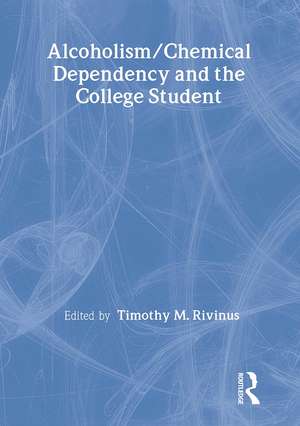Alcoholism/Chemical Dependency and the College Student
Autor Leighton Whitaker, Timothy Rivinusen Limba Engleză Paperback – 9 apr 1988
Preț: 122.86 lei
Preț vechi: 154.97 lei
-21% Nou
Puncte Express: 184
Preț estimativ în valută:
23.52€ • 24.46$ • 19.71£
23.52€ • 24.46$ • 19.71£
Comandă specială
Livrare economică 20 februarie-06 martie
Doresc să fiu notificat când acest titlu va fi disponibil:
Se trimite...
Preluare comenzi: 021 569.72.76
Specificații
ISBN-13: 9780866568128
ISBN-10: 0866568123
Pagini: 274
Dimensiuni: 148 x 210 x 19 mm
Greutate: 0.41 kg
Ediția:1
Editura: Taylor & Francis
Colecția Routledge
Locul publicării:Oxford, United Kingdom
ISBN-10: 0866568123
Pagini: 274
Dimensiuni: 148 x 210 x 19 mm
Greutate: 0.41 kg
Ediția:1
Editura: Taylor & Francis
Colecția Routledge
Locul publicării:Oxford, United Kingdom
Public țintă
Professional Practice & DevelopmentCuprins
ContentsPreface
- Foreword
- Introduction
- Physical Effects and Consequences of Mind Altering Drugs Used by College Students
- The Counselor’s Dilemma: Treating Chemical Dependence at College
- Inherent Problems in Substance Abuse Education on University Campuses: Student Perspectives
- Theory and Applications of Alcohol and Drug Education as a Means of Primary Prevention on the College Campus
- Difficulties of Diagnosis, Differential Diagnosis, and Dual Diagnosis in the Late Adolescent and Young Adult Substance Abuser
- Treatment Alternatives for University Students With Substance Use/Abuse Problems
- Integrated Treatment Approach With the Chemically Dependent Young Adult
- Substance Use Disorder and College Students: Inpatient Treatment Issues: A Model of Practice
- Working With Children of Alcoholics on a College Campus: A Rationale and Strategies for Success
- Alcohol and Other Drug Issues at Brown University: Two Administrative Perspectives on a Common Problem
- Afterword
- Index
Descriere
This first-rate volume details for college mental health and counseling services, college administrators, and faculty the problems of substance use and abuse among students and describes successful approaches of intervention. In an educated and nonjudgmental fashion, professionals and students who have contributed to this volume provide information on the scope of the problem and its prevention and treatment. Counselors and psychotherapists, already familiar with the helpful methods of empathy, support, and interpretation, can combine these skills with caring forms of confrontation that must be developed to help the substance abuser and all those who are affected by substance abuse.
